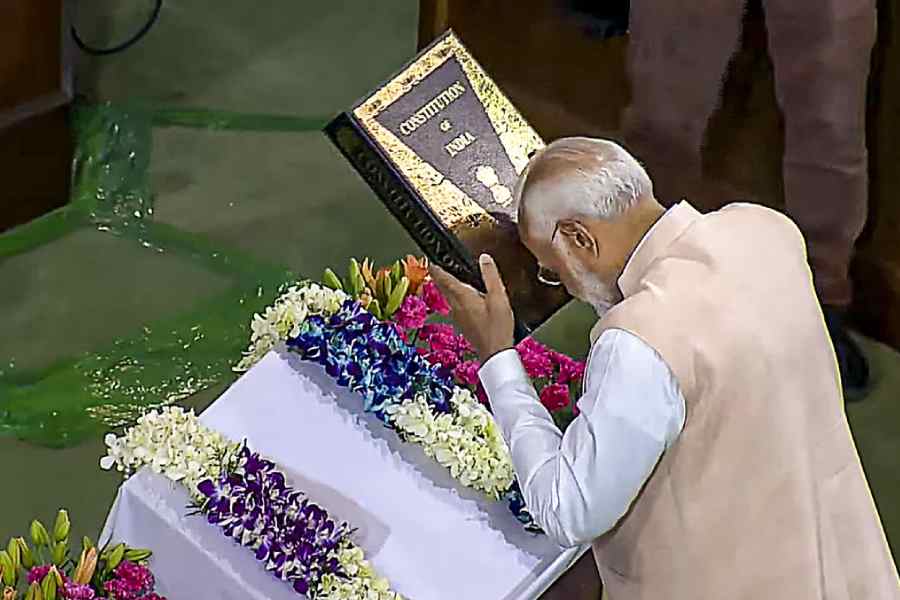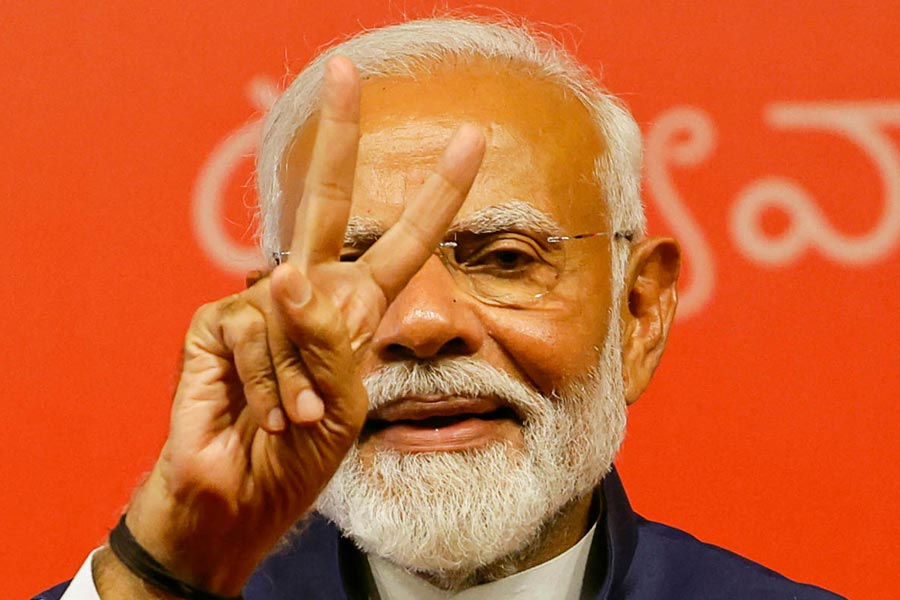As Narendra Modi rose to address NDA members after being chosen alliance leader and candidate for Prime Minister, the BJP leader anchoring the event unleashed the all-too-familiar slogan.
“Phir teesri baar Modi sarkar (A Modi government for a third time),” Bhupendra Yadav shouted.
But the man the slogan sought to hail ignored it. And not once did Narendra Modi, during his hour-and-a-half thanksgiving speech at the Central Hall of the old Parliament building, refer to either a “Modi sarkar” or a “Bhajpa sarkar” — staples of his earlier speeches.
The term that punctuated his speech throughout on Friday as he thanked the BJP’s allies for their support was “gathbandhan sarkar (coalition government)”.
“This is the victory of ‘gathbandhan’,” said the man who had over the past 10 years repeatedly asserted the death of the “coalition era” as he ruled the country with a brute majority of his own.
Later, President Droupadi Murmu invited Modi to form the next government.
Modi drove to meet the President and afterwards told reporters the swearing-in would be held on Sunday evening.
“This morning the NDA allies chose me as the leader and informed the President. The President then called me… and appointed me PM-designate. I told the President that Sunday evening would be convenient (for oath-taking),” he said.
In his Central Hall speech, Modi had declared his third straight term would actually be the “fourth term of an NDA government”, counting Atal Bihari Vajpayee’s three tenures — in 1996 (just 13 days), 1998-99 and 1999-2004 — as one along with his own previous two terms.

Narendra Modi bows before the Constitution at Samvidhan Sadan in New Delhi on Friday. PTI photo
Technically, Modi did head coalition NDA governments in the past 10 years but he rarely referred to them as such, preferring to speak of “Modi sarkar” and “Bhajpa sarkar” instead. His party’s tallies of 282 and 303 in 2014 and 2019, respectively, meant he was not dependent on the allies.
There was a nod to inclusivity and secularism, too. “Our alliance is in the true sense a reflection of India’s true spirit, India’s soul,” Modi said. “Friends, we are committed to the ‘sarvpanth sambhav (all sects are equal)’ spirit of our Constitution.”
He underlined how the NDA had been given “the opportunity to serve” in the Christian-majority states of the Northeast and in Goa.
“This is the most successful alliance in the political history of the country. It has completed three successful terms and is now entering the fourth,” he said.
“The NDA is an organic alliance,” he added, crediting the “team spirit” of the alliance partners for the election victory.
Modi spoke of governing by “consensus”, aware he would now have to grapple with the compulsions of coalition, a challenge he had never before faced in his 23 years as Gujarat chief minister and Prime Minister.
“Humne bahumat haasil kiya hai…. Sarkar chalane ke liye bahumat avashyak hai, loktantra ka ye ek sidhant hai. Lekin desh chalane ke liye sarvmat bahut jaruri hota hai (We have gained a majority…. A majority is necessary to run a government; it’s one of the requirements of democracy. But to run the country, consensus is key),” he said. He promised to “continually strive to build consensus”.
Modi had in the past 10 years never tired of stressing the need for a “full-majority” government to take “big decisions”, such as the abrogation of Article 370, amendment of the citizenship law, and the ban on the instant triple talaq.
Modi had bowed before a copy of the Constitution, placed on a stand on the stage, after arriving at the Central Hall for the election of NDA leader. His name was proposed by senior BJP leader Rajnath Singh and seconded by Amit Shah and leaders of the allies.
Later, Modi drove to the homes of veterans L.K. Advani and Murli Manohar Joshi — whom he had sidelined soon after coming to power in 2014 — to take their blessings.
In his speech at the Central Hall, he had earlier claimed that as a functionary in the BJP organisation during the Vajpayee days, he too had been associated with the old NDA. “My relation with the NDA is of 30 years,” he said.
He remembered Vajpayee and other NDA stalwarts of that period such as Parkash Singh Badal of the Akali Dal, George Fernandes of the Samata Party and Sharad Yadav of the JDU, saying the “alliance seed they had planted has turned into a full-grown tree now”.
Indirectly acknowledging how crucial the BJP’s regional allies are to the survival of his third government, Modi said there should be an “atut rishta (deep bond)” between “regional and national aspirations”.
He assured the NDA partners he would be “available 24x7 for them” and stressed he would try his best to fulfil the aspirations of the allies.
Modi made an outreach to the Opposition too, saying that to him, all MPs across party lines were equal.
“Apna paraya kuchh nahi hai, sabko gale lagane me humne koi kami nahi rakhi hai (There is no ‘us’ and ‘them’, I have tried to embrace each of them),” he said.
But he castigated the Opposition for portraying the results as a defeat for him, saying the poll results were “NDA ka maha vijay (NDA’s great victory)”.
Modi cautioned the newly elected MPs against falling for fake calls saying they had been selected for ministerial berths. “Please verify those calls. Verify if the person calling you has any authority to do so,” he said.
He alleged the Opposition would try to spread fake news but “this country will not run on the basis of breaking news”.
EVM jab
Modi attacked the Opposition for having questioned the credibility of the electronic voting machines and asserted that the election results had silenced them.
“EVM ne unko chup kara diya (The EVMs have silenced them),” he said.
He said that when he received congratulatory calls after the results were declared, “I said, ‘Leave aside the numbers, tell me if the EVM is alive or dead’.”
He accused the Opposition of trying to defame India’s democracy and elections and jeered at the Congress for failing to win even 100 seats. The Congress tally stands at 99.











